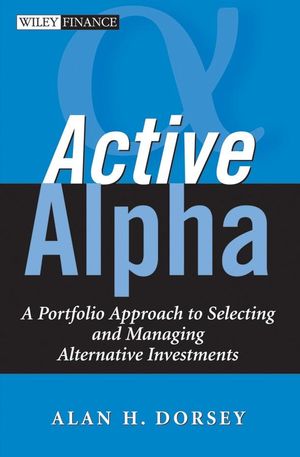Active Alpha: A Portfolio Approach to Selecting and Managing Alternative InvestmentsISBN: 978-0-471-79132-4
Hardcover
400 pages
August 2007
 |
||||||
Preface xi
Acknowledgments xv
About the Author xvi
PART ONE Alternative Investments and Investors
CHAPTER 1 Introduction 3
Integration of Alternative Investments and Traditional Asset Classes through Factor Analysis 3
Approaches to Portfolio Construction 4
The Identification of Alpha and Beta in New Investment Strategies 5
What the Future Holds 8
Summary 8
CHAPTER 2 Investors in Alternative Investments and the Necessary Ingredients for a Successful Program 11
Types of Investors and Their Approaches to Alternative Investments 12
The Necessary Ingredients for a Successful Alternative Investment Program 18
Support from Investment Management Firms and Consultants 33
Investors Deciding to Minimize the Use of Alternative Investments 36
Summary 42
CHAPTER 3 Hedge Funds 43
Performance and Diversification Attributes 43
Market Segmentation 47
Hedge Fund Strategies 47
The Construction of a Segregated Portfolio of Hedge Funds 69
Summary 74
CHAPTER 4 Private Equity 77
Performance and Diversification Attributes 77
Dispersion of Returns 83
Private Equity Strategies 85
The Construction of a Segregated Portfolio of Private Equity 95
Summary 97
CHAPTER 5 Real Estate 99
What Is the Attraction? 99
Real Estate Strategies 104
The Construction of a Segregated Portfolio of Real Estate 114
Summary 123
CHAPTER 6 Currency, Commodities, Timber, and Oil and Gas 125
The Qualitative Determinants of Returns 125
The Attraction of Currency 127
The Attraction of Commodities 130
Currency and Commodity Strategies 132
The Attraction of Timber 136
Timber Strategies 139
The Attraction of Oil and Gas 140
Oil and Gas Strategies 142
The Construction of a Segregated Portfolio of Currencies, Commodities, Timber, and Oil and Gas 144
Summary 147
PART TWO Alternative Investments in Traditional Portfolios
CHAPTER 7 The Migration of Hedge Funds into the Private Equity Realm 151
Are Hedge Funds Gaining Market Share from Private Equity? 152
How Well Suited Are Hedge Funds to Private Equity Investments? 157
The Power of Compounding: A Comparative Advantage for Private Equity 159
The Fee Differential between Hedge Funds and Private Equity 160
Alternative Investment Fee and Term Components 164
Summary 176
CHAPTER 8 Cash Flow Forecasting and Its Implications for Rebalancing 177
Alternative Investment Cash Flow 177
Asset Allocation: Achieving Policy Targets and Rebalancing 195
Cash Flow Forecasting Tools 199
Portfolio Rebalancing Tools 202
Summary 205
CHAPTER 9 Leverage and Portable Alpha 207
Leverage 208
Portable Alpha 213
What Is Portable Alpha? 213
The Benefits and Issues with Portable Alpha 218
Reevaluating the Premise for Portable Alpha 219
The Use of Hedge Funds in Portable Alpha 221
Alternative Thinking about Alpha 227
Summary 231
CHAPTER 10 Factor Analysis: The Rationale 233
Marketplace Changes that Warrant Factor Analysis 234
The Asset-Class Concept 236
Alternative Investments and Factor Analysis 241
Problems with Selecting Vehicles for Alternative Investment Portfolio Construction 243
Quantitative Building Blocks 244
Risk Budgeting Using Factors 249
Beyond Traditional Asset-Class Risk Budgeting 250
Qualitative Independent Variables 253
Illiquidity Factor 255
Summary 271
CHAPTER 11 Factor Analysis: The Findings and Discovering Active Alpha 273
Time Series Delineation and Issues 273
Mean-Variance Optimization 277
Problems Using Mean-Variance Optimization with Alternative Investments 294
Regression Analysis with Alternative Investment Factors 294
Regression Analysis Results and Observations 296
Problems with Conducting Regression Analysis on Alternative Investments 302
Factor Optimization 304
Active Alpha versus Passive Alpha 309
Problems with Factor Optimization 311
Synthetic Portfolios of Alternative Investments 312
Factor Measurement and Risk Monitoring 313
Summary 314
Appendix: Regression Methodology 316
Notes 347
Glossary 351
References 363
Index 369



